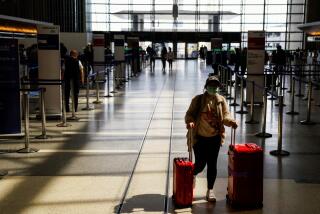L. A. Cop Gets Results on Request to Unravel Riddle of Russian Relatives
- Share via
A Los Angeles police officer who visited the Soviet Union two months ago as part of an unusual cop swap returned with an unanticipated souvenir: a Russian mystery to solve.
So it is fitting that Sgt. Greg Braun used an unorthodox method to crack the case. He called upon a private investigator to unravel the secret of the missing Russian immigrants.
The mystery landed in Braun’s lap in July when as he was visiting the U.S.S.R. with a delegation of police officers from Kern and Orange counties. The lawmen were there as part of an exchange program that earlier had sent Soviet police to the United States for short visits.
The American officers were boarding a midnight train for Leningrad when a Moscow policeman stepped forward and handed Braun an envelope.
Enclosed was a handwritten note in rudimentary English. There were also copies of two faded photographs and a photocopy of a tattered envelope that had been mailed Aug. 14, 1924, from San Francisco to a remote Russian village.
The Moscow police officer asked Braun to help find a friend’s American relatives--the offspring of Russian immigrants who had settled in the United States 85 years ago. Pointing to a non-English-speaking officer who was standing nearby, the Soviet policeman said, “Please do this for us.”
Braun remembers studying the documents and shaking his head. “I looked at it, and it said 1924. I said to myself: ‘Give me a break. If this is the only clue, don’t count on me finding these people.’ ”
When Braun, 44, returned to his job as an assistant watch commander at the West Valley police station in Reseda, he asked Russian-speaking Detective Serge Riyevski of the Hollywood station to help with the translation of Russian names in the note.
“I knew I’d be looking for the children or grandchildren of these people,” Braun said. “I didn’t have the vaguest idea what I was getting into. All I knew was I’d agreed to do a favor for a guy who asked me.”
Braun learned there are plenty of different ways that the name of the immigrant family might be spelled today. It could be Baklanoff or Bakhlanov or Bakhlanoff or Baklanov or Bakly, Riyevski concluded.
Mindful that police computers are off-limits for personal use, Braun decided to seek outside professional help.
“I called a friend who’s a P.I.,” he said.
The Burbank private investigator, who asked not to be named, turned to property and utility records to hunt for Baklanoffs, Bakhlanovs, Bakhlanoffs, Baklanovs and Baklys. He struck pay dirt with the last name.
Braun started phoning names on the investigator’s list. His first call went to Ronald Bakly in Placerville.
“I remember my grandmother telling us stories about what it was like in Russia,” said Bakly, 44, an electronics service technician. “I told him to call Aunt Emma.”
Emma Bakly, 75, lives on Russian Hill in San Francisco. She was able to relate her family’s complete history to Braun, starting with her mother’s arrival in San Francisco in 1906 and her father’s immigration in 1910.
“At first I thought Greg was calling to tell me that my relatives were on their way for a visit,” she said. “I thought, ‘The Russians are coming--the Russians are coming!’ But Greg laughed and said no, they just want to get acquainted with us.”
Bakly said she plans to write her Russian relatives and invite them to visit, although she says she only has room for two of them at a time. She speculates that some of them probably won’t be free to come any time soon, however.
“Look at the Sept. 2 issue of Time magazine, Page 52. There’s a picture of a cousin, Oleg,” she said. An accompanying story identifies Oleg Baklanov as a member of the “Gang of 8,” the so-called State Committee for the State of Emergency that led last month’s unsuccessful coup against Soviet President Mikhail S. Gorbachev.
Other American family members, such as in-law Judy Bakly of La Canada Flintridge, say they are eager to correspond with the Russian Baklanovs.
“I teach art at Toll Junior High in Glendale and have students from Russia who can help me write,” she said. “I’ve told them where my husband’s family is from, and they recognized the name and the area. They were surprised. It meant a lot to them to hear that.”
Braun said he has prepared a detailed family tree that lists 31 Bakly family members. It has already been dispatched to the Moscow policeman.
“I’ve never been a detective. In my 23 years with the department I’ve always preferred to work patrol,” Braun said.
He said his role in solving the missing persons mystery didn’t change his mind--even though it was a case that came from Russia with love.
More to Read
Sign up for Essential California
The most important California stories and recommendations in your inbox every morning.
You may occasionally receive promotional content from the Los Angeles Times.














